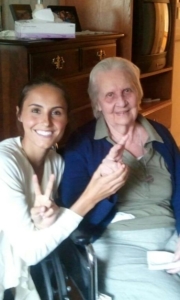
Devin Anuzis is Corporate Manager, Customer Experience at Benchmark, the leading provider of senior living services in the Northeast. Serving as the “voice” of the customer program, Devin manages multiple feedback channels and deciphers the feedback for company stakeholders to ensure the customer’s voice is clearly heard and considered in all decisions. In her role, she combines her experience in marketing and communication with her strong, empathic nature to respond to every form of customer input.
Devin joined Benchmark in 2013 as Coordinator of Customer Experience after receiving a master’s degree in business administration from Lynn University with a focus on mass communication and media management. She earned a bachelor’s degree in marketing from the University of Tampa.
A former Division 1, intercollegiate soccer player, Devin is an eager traveler and animal-lover living in Norwood, Massachusetts, with her husband, George, and their toy poodle, Summer, and cockapoo, Wesley.
Contact Devin at Danuzis@benchmarkquality.com.
Tell me a little about your organization and your role within it.
Benchmark Senior Living was founded in 1997, and we now have 56 properties throughout the northeast, from Vermont to Pennsylvania. Our goal is to provide exceptional care, but our mission focuses on the whole experience of our residents and family members. We provide assisted living, memory care, independent living, and we also have 4 continuing care retirement communities with skilled nursing capabilities.
I oversee the customer experience—more specifically relating to the family members or influencers, but I also support our teams that oversee the experience of our residents. I’m also fortunate enough to be involved in a lot of the more strategic discussions that happen throughout the company—anything that would involve our residents and family members.
We recently did a complete rebrand of the company—a new mission statement, new vision, new values. Our focus is on transforming lives through human connection, and in turn that’s all about the experience we provide to our residents and family members and anyone who interacts with our organization. Our CX is really at the heart now of who we are as an organization.
How do you balance family members and residents when it comes to who you treat as your ultimate customer?
In the end, our residents are our ultimate customer, but at Benchmark we believe it’s our job to support the whole person, and that includes those they love. Often family members are making many of the big decisions, and if the resident isn’t happy and feeling like they’re fulfilled and that they have a purpose, the family members are going to see that and advocate for their loved one. If Mom or Dad isn’t happy and satisfied, then neither is the family. There are times too, however, when a family member is struggling emotionally, even if their loved one is happy, and we feel it is important to support them as well.
Could you walk through how you help employees understand what life is like for residents?
We have a pretty extensive onboarding which begins with an intensive 3-day program. This includes general orientation but also a full day devoted to understanding our elderly residents. We want our associates to understand what they’re getting into. For younger people who might not have those kinds of experiences or interactions with elderly people in their daily life, it’s a great way to get them understanding the people they’ll be working with, how to empathize with them and how to help them.
 How do you communicate these goals in the training?
How do you communicate these goals in the training?
Empathy and sensitivity training is critical when it comes to the work that we do every day. We have a variety of these types of trainings that are required during onboarding, but there were two that really stuck with me when I completed my onboarding 5 years ago.
One exercise we go through focuses on when people get older, what they are physically able to do on their own becomes more limited and therefore can impact their daily activities and lifestyles. We ask new associates to write down 3 things in life they can’t live without – hobbies, interests, people, or things – and then go through scenarios that some of our residents have actually gone through and begin to take these experiences and hobbies ‘away’ due to some of the changes that happen when you get older. To have our associates realize that the aging process can bring a huge feeling of loss for our residents and also our family members and that it is our job to understand that and try to support them through this by providing those positive experiences is essential to the success and happiness of our residents and family members.
Another exercise we go through revolves around dining. Dining is an important and emotional part of our residents’ day, so we run an exercise called “Eating at 80.” We have our associates wear gloves, fogged glasses, and earplugs, to simulate the sensory experience of getting older, and then have them try and eat a meal. You don’t necessarily understand how difficult it is until you experience it, especially something that you probably take for granted when you’re younger and more able-bodied.
What kind of impact have you seen from these programs?
We’ve gotten terrific feedback over the years that the onboarding exercise was the most impactful for the associates going through it. You truly do not understand what it feels like unless you can physically replicate the experience. It provides a lasting memory for a lot of our associates. Our residents agree that people who have been able to go through that training are more helpful—they’re not feeling rushed, or feeling like they’re being told to do things they really are not capable of doing, and there’s a lot more compassion there and more of a partnership.
How did the program itself come about?
Our VP of Dining Services, Guy Hemond, had it in place before I came here, but it wasn’t something many of our employees had gone through at that point. However, the long-term impact that it had for those who did go through it made us think that we should make sure more people were getting trained that way.
Do you have any advice for others who want to create empathy in a similar way?
Think of ways to try and get people into the mindset of your customer. Fully understand your customers’ experiences, and their emotional journey, and then try and relate to it, and create those connections between your staff and your customers.
I think as CX becomes a larger focus, as long as people really stay centered around seeing the world through their end user’s lens and focus on creating those positive memories through personalized, unique experiences, then you’re on the right track. You’re not elevating human connection unless you’re creating those positive experiences unique to each customer. In order to do this, you need to deeply understand them and in our case, meet them where they are in life. In addition, taking all the criticism, good and bad, is key to the process of creating an exceptional customer experience, and developing a deeper connection between your employees and your customers.
Interested in workshops? Read more here.
Interested in journey mapping? Read more here.
Interested in improving your CX? Read more here.

